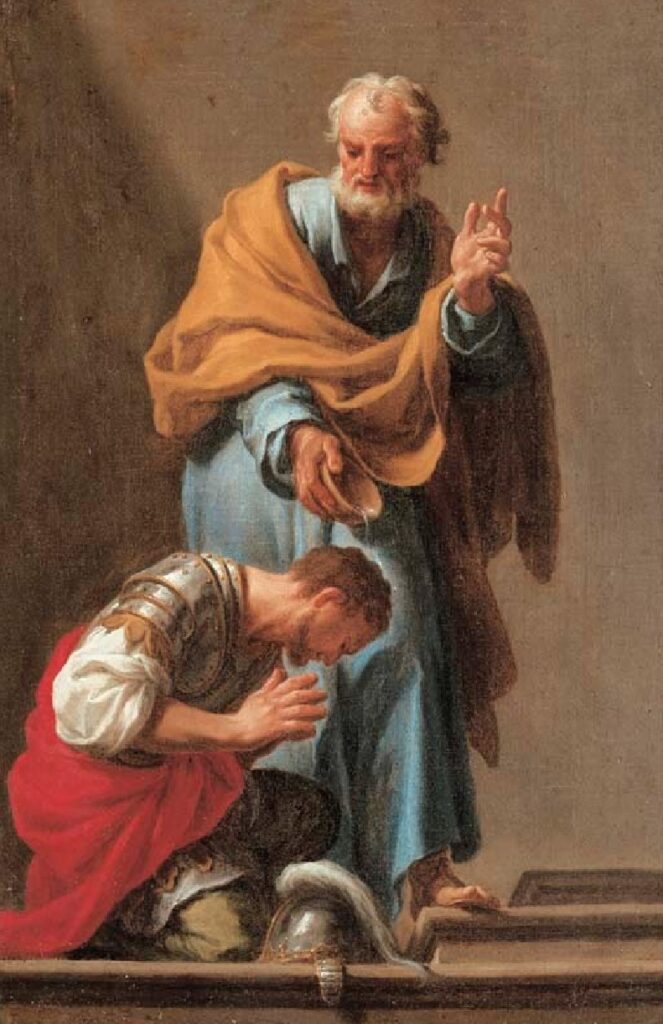It’s a peculiar era in the Church that witnesses the rise of ultramontanism. Sound theology has laid that heresy to rest many times and yet it keeps popping up. Regrettably, there will always be popes who welcome ultramontanism and the unconditional adherence that comes with it, just as there will always be those souls who are more than eager to kowtow to the man who happens to be pope.
Ultramontanism is the false belief that everything a pope says is without error. Everything a pope decides must be right. Everything a pope speaks or does is paramount and cannot be questioned. The shocking rhetoric of the ultramontanists is found in such slogans as, “If you don’t believe everything the pope teaches, then you’re not Catholic.”
Ultramontanism has been with the Church since her beginning. The first ultramontanist was the catechumen, Cornelius. Saint Peter, our first pope, was called to Caesarea. When he arrived, we’re told:
As Peter entered the house, Cornelius met him and fell at his feet in reverence. But Peter made him get up. “Stand up,” he said, “I am only a man myself.” (Acts 10:25-26)
Cornelius’ actions went beyond the filial reverence of the believers (cf. Acts 5:15-16), who saw the chief apostle as a reflection of God’s presence and saw the divine power working through him. In Cornelius’ case, he sought to circumvent God and saw Saint Peter himself as some type of demigod. The apostle saw the abuse and was right to correct Cornelius. As a man of virtue, Saint Peter would allow no wiggle room for ultramontanism.
In Cornelius’ instance, however, we can understand his actions since he was still a pagan and had not yet been taught the way of the Lord Jesus. Since the early Church, however, we have seen many people who do not have that excuse, ultramontanist Catholics who should know better.
The Fathers of the First Vatican Council had to humble the ultramontanists of the nineteenth century. Contrary to popular belief, Pastor Aeternus, the decree on papal infallibility, did not enhance the power of the papacy but actually tempered and limited it.

Prior to that decree, it was never clear where the teachings and thoughts of a pope stood in terms of his authority. For instance, when Pope Gregory XVI first saw a steam locomotive, he cursed it and called it the “road to hell” (a play on the French chemins de fer). Some then wondered exactly where trains stood in Catholic doctrine. With Vatican I, however, clear formulae emerged; the faithful could know when the pope was speaking infallibly. And not.
Ultramontanists, especially the current neo brand, blur levels of authority and give supreme credence to everything a pope might utter.
They so exaggerate the authority and power of the papacy that they become confused about the Mystical Body of Jesus Christ even as they live and work within it. They become papal fideists, claiming some special virtuous loyalty to the pope, even as they morph the man holding the papal office into some type of leviathan, beyond divine revelation and sacred tradition.
Ultramontanists claim merely to be showing reverence for the man holding the papal office. They refuse to roll up their sleeves and enter into the trenches of real theological reflection and work.
The ultramontanists rally – in almost partisan political fashion – around one man claiming that everything he says is right and everything he even happens to whisper is true. They sadly become the custodial services to a single man, cleaning up his messes, veiling his exaggerations, explaining his mistakes away, while engaging in name calling and accusations against loyal sons and daughters of the Church who raise questions, pose challenges, and indicate possible errors.
In Vatican II’s Dogmatic Constitution on Divine Revelation, Dei Verbum, the Council Fathers were clear:
But the task of authentically interpreting the word of God, whether written or handed on, has been entrusted exclusively to the living teaching office of the Church, whose authority is exercised in the name of Jesus Christ. This teaching office is not above the word of God, but serves it, teaching only what has been handed on, listening to it devoutly, guarding it scrupulously and explaining it faithfully in accord with a divine commission and with the help of the Holy Spirit, it draws from this one deposit of faith everything which it presents for belief as divinely revealed. (#10)
The pope is a servant to the Word of God. He is the interpreter of the Deposit of Faith, while also serving as its guardian and attendant. Divine revelation keeps the magisterium in check, even as the magisterium interprets and teaches.
So, when a pope blurs the Church’s ability to judge and instruct in the areas of moral truth, compromises doctrinal integrity, attempts to bind the consciences of the faithful about matters beyond his competence such as climate change and the empirical sciences, calls for the blessing of couples in states of sin, or brings a pagan idol to a Christian altar during worship, divine revelation accuses him long before any believer does.
Contrary to ultramontanists, believers who truly love the papacy – both the man and the office – will speak words of admonition and reform. They will pray for conversion and seek to live up to the daunting words of Saint Paul:
But speaking the truth in love, we must grow up in every way into him who is the head, into Christ, from whom the whole body, joined and knit together by every ligament with which it is equipped, as each part is working properly, promotes the body’s growth in building itself up in love. (Ephesians 4:15-16)
Ultramontanism gives no strength or vigor to the Church. It borders on a flattery that serves no good and causes great harm. The Church is perennially strengthened by integrity and moral fortitude. She is repeatedly renewed by holiness, which is achieved by God’s grace through the “obedience of faith” given to the Gospel.















